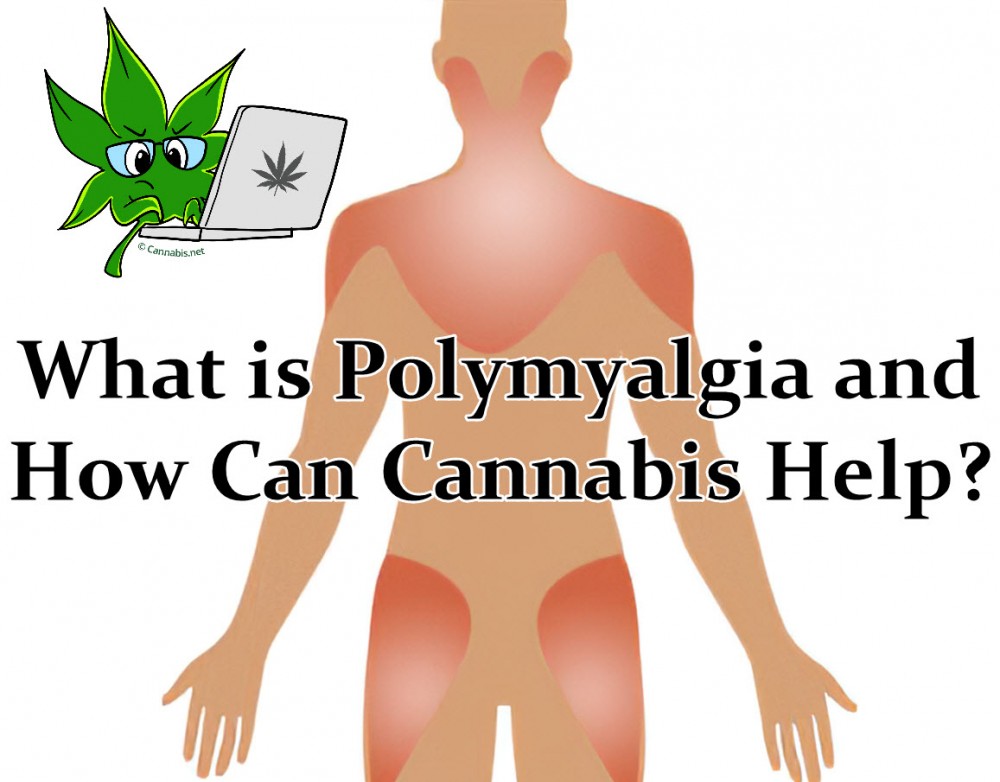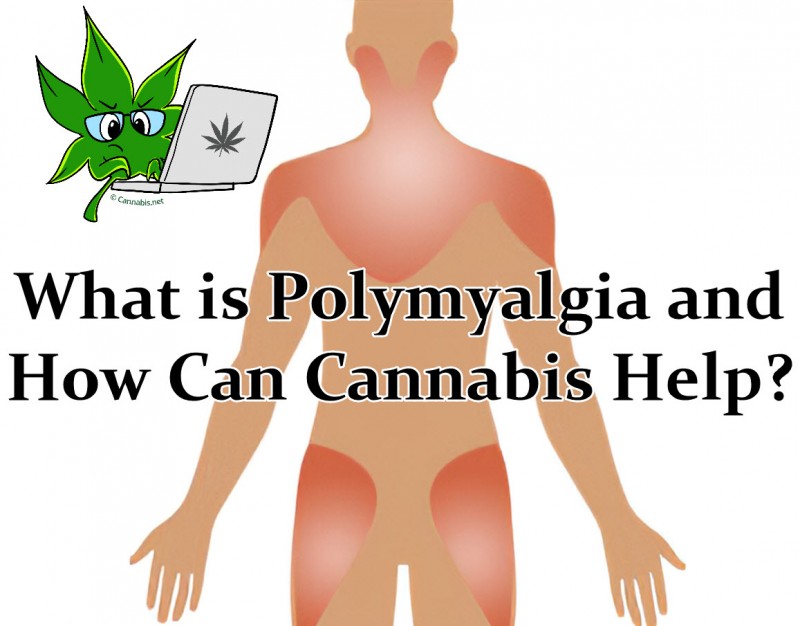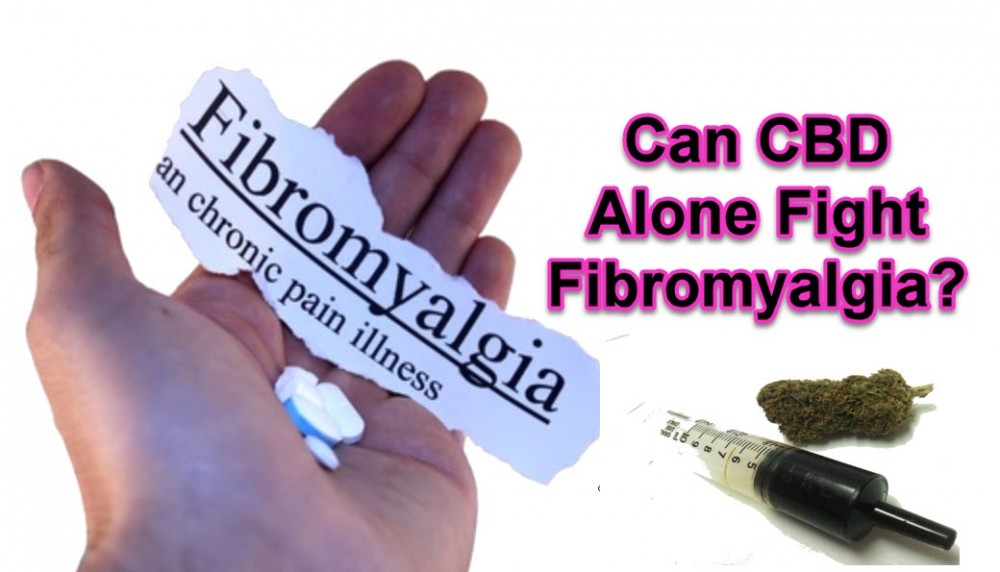What is Polymyalgia and How Can Cannabis Help?

Polymyalgia rheumatica is an inflammatory disorder that causes much pain and stiffness in the muscles, especially in the shoulders. The pain comes on quite fast and it is more present in the morning. It is a disease that rather hits older people. Very seldom, people under 50 will suffer from it. It is more prominent in adults older than 65. The condition is usually treated with a low dose of corticosteroids. Doctors could also prescribe calcium and vitamin D supplements to prevent bone loss. Sometimes an immune suppressant is also prescribed.
All these drugs cause some serious side effects like weight gain, diabetes, high blood pressure, clouding of the eye lenses, and osteoporosis. Also, over the counter pain killers are included as pain sometimes could be excruciating. The sad story is that most pharmaceuticals require secondary drugs to combat them. These secondary drugs cause other side effects, and then more drugs are needed to counter that. This is why so many seniors end up taking 10 or more tablets daily. For this reason, many are starting to look into more natural ways to treat their conditions.
What is Polymyalgia Rheumatica?
Polymyalgia is mostly related to pain and stiffness in the neck and shoulders. Eventually, the pain spreads to other parts of the body, like hips and thighs. Both sides of the body get affected and other symptoms are also an underlying cause. Some of these other symptoms include:
Fatigue
Malaise. A general sense of discomfort which is difficult to identify
Loss of appetite
Sudden weight loss
Anemia, or low red blood cell count
Depression
Low-grade fever
Limited motion
The symptoms grow stronger over time and eventually, a person has a hard time performing everyday activities like standing up from the couch, getting dressed, or getting out of the car. A person could also have trouble sleeping.
What is the Cause of Polymyalgia?
Like so many other diseases, there is no known cause for polymyalgia. It is believed that certain genes and gene variations could increase the risk of polymyalgia rheumatica. Environmental factors also seem to influence the condition. New cases of polymyalgia are often related to seasonal changes. Something like a viral infection could trigger polymyalgia.
To diagnose the condition, doctors use similar tests as for other inflammatory conditions. They check for inflammation and blood abnormalities. These tests measure the erythrocyte sedimentation and C-reactive protein levels. High levels usually indicate inflammation.
Why Cannabis is a Good Treatment
We know that the phytocannabinoids like THC and CBD, plus other cannabinoids frequently discovered, have therapeutic effects. We also know that our endocannabinoid system has receptors throughout the body that interact with the phytocannabinoids. This rather complex phenomenon involves endogenous and exogenous ligands and cross-reactions. When it comes to arthritis-related pain, the endocannabinoid system together with the cannabinoids derived from cannabis plays a major role in pain reduction. The human synovial fluid from arthritis joints contains anandamide and 2-arachidonyl glycerol, meaning that these endocannabinoids are synthesized when tissue is damaged.
Those suffering from any inflammation-orientated condition now that swollen joints and muscles lead to discomforting pain and redness. Medical marijuana is a natural alternative to traditional medications. Cannabis can help with the following symptoms:
Muscle tone
Pain
Appetite
Mood
Inflammation
Cannabidiol Effective for Polymyalgia
Because of the fact that many patients, seniors, in particular, need take so many pills to treat their conditions, it is only natural to look for something less invasive. CBD as such is a great alternative for polymyalgia rheumatica. It is excellent for managing pain and the reduction of inflammation. Scientific studies state that CBD does not work directly on the CB1 and CB2 receptors, but rather work by enhancing the body’s ability to use more of its own endocannabinoids. There is so much more to be learned, as the endocannabinoid system is vastly complex.
The analgesic and anti-inflammatory properties of CBD
CBD is an anti-inflammatory and therefore works very well in relieving pain in polymyalgia. It is already proven to function for arthritis pain that is also an inflammatory condition. CBD reduces inflammation by changing the way that pain receptors respond to stimuli. As a result, pain is also reduced.
Polymyalgia rheumatica is also known for the stiffness and pain of muscles. The analgesic properties of CBD help to deal with pain and muscle stiffness. In scientific studies on animals, it was found that CBD remarkably reduced chronic pain and inflammation.
CBD is effective in treating depression, something that is also known to patients suffering from this condition. It relaxes the body and mind and improves movement. It also helps a person to sleep better. CBD is also significant in treating auto-immune diseases. Polymyalgia is suspected to be an auto-immune disease. CBD improves the symptoms of auto-immune diseases and would have the desired effect on polymyalgia.
Afterthoughts
Because of the effectiveness and safety of cannabis, it is natural to conclude that THC and CBD both would have a positive effect on polymyalgia rheumatica.
CANNABIS AND NERVE AND MUSCLE PAIN, READ MORE..
CANNABIS FOR FIBROMYALGIA PAIN UPDATED GUIDE!







